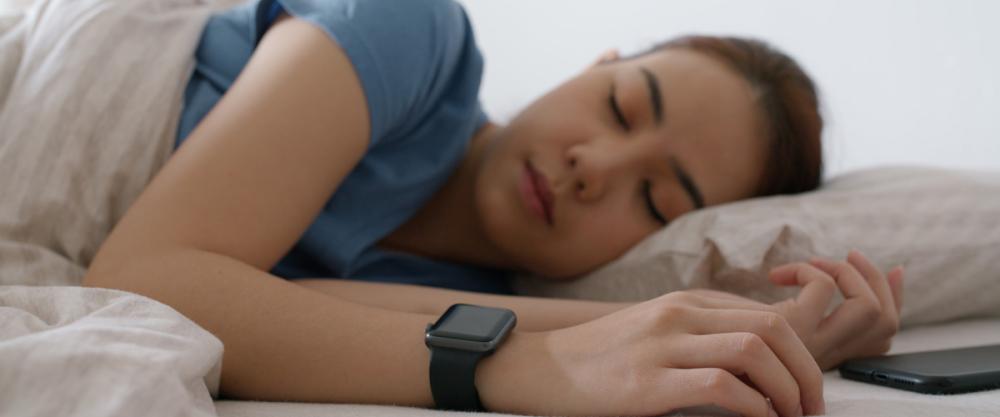Are you worried that your restless nights might be more than just poor sleep? Sleep apnea is a serious condition that often goes unnoticed but can impact your health in big ways.
You might be wondering if your fitness tracker can help spot the warning signs while you sleep. Can these gadgets really detect sleep apnea, or are they just tracking your steps and heart rate? Keep reading to find out how your device might be your first line of defense in catching this hidden problem early.
How Fitness Trackers Monitor Sleep
Fitness trackers have changed how people watch their sleep. These devices use different tools to collect data. They track your movements, heart rate, and more. This helps them estimate how well you sleep each night.
Understanding how fitness trackers monitor sleep reveals their strengths and limits. It shows what these devices can and cannot do for sleep health.
Sensors And Data Collection
Fitness trackers have small sensors on the wrist. These sensors measure heart rate and skin temperature. They also detect body movements using accelerometers. This data helps the device guess when you fall asleep and wake up.
Some trackers include pulse oximeters. These sensors measure blood oxygen levels. This data can hint at breathing problems during sleep.
Sleep Stages And Patterns
Fitness trackers try to identify different sleep stages. These stages include light, deep, and REM sleep. The devices use heart rate and movement to guess each stage. Tracking stages helps users understand sleep quality.
Patterns over time show sleep habits. They reveal if sleep is consistent or interrupted. This information guides better sleep routines.
Limitations Of Consumer Devices
Fitness trackers give estimates, not medical diagnoses. Their sensors can miss subtle sleep problems. They cannot detect all signs of sleep apnea accurately.
Tracking errors happen due to movement or poor sensor contact. Devices may confuse restlessness with wakefulness. They also cannot measure brain activity like clinical sleep tests.
Fitness trackers help monitor sleep but do not replace doctors. For serious concerns, professional sleep studies are best.

Credit: www.cpap.com
What Is Sleep Apnea
Sleep apnea is a common sleep disorder that affects breathing during sleep. It causes brief pauses in breathing or shallow breaths. These interruptions can happen many times each night. This leads to poor sleep quality and tiredness during the day. Many people with sleep apnea do not realize they have it. Understanding this condition is important for better health.
Types And Symptoms
There are three main types of sleep apnea. Obstructive sleep apnea (OSA) happens when throat muscles relax too much. This blocks the airway. Central sleep apnea (CSA) occurs when the brain fails to send signals to breathe. Complex sleep apnea is a mix of both OSA and CSA.
Common symptoms include loud snoring and gasping for air. People may feel very tired during the day. Others might wake up with headaches or dry mouth. Trouble concentrating and mood changes are also signs.
Health Risks Involved
Untreated sleep apnea can cause serious health problems. It increases the risk of high blood pressure and heart disease. Stroke risk also rises in people with sleep apnea. The condition can lead to type 2 diabetes and weight gain. Poor sleep affects memory and focus. It also raises the chance of accidents due to tiredness.
Fitness Trackers And Sleep Apnea Detection
Fitness trackers are common tools for health and activity monitoring. Many people wear them daily to track steps, heart rate, and sleep patterns. Some devices now offer features that may help detect signs of sleep apnea. This condition causes breathing to stop and start during sleep, leading to poor rest and health risks.
These trackers use sensors to gather data on breathing, oxygen levels, and heart rate. The data can highlight unusual patterns that suggest sleep apnea. While not a medical device, a fitness tracker can provide useful clues. Understanding what these devices can do helps users know when to seek professional advice.
Capabilities Of Popular Devices
Many popular fitness trackers include sensors for heart rate and blood oxygen. Some models track breathing patterns and sleep stages. These features help detect irregular breathing during sleep. Devices from brands like Fitbit and Garmin offer oxygen saturation monitoring. This can reveal drops in oxygen that relate to sleep apnea. The data is often available in easy-to-read reports on apps.
Accuracy Compared To Medical Tests
Fitness trackers are not as accurate as medical sleep studies. Polysomnography remains the gold standard for diagnosing sleep apnea. Trackers can miss some events or give false alerts. They provide a general overview, not a detailed diagnosis. Users should not rely solely on tracker data for health decisions. Trackers are useful for spotting potential issues early.
Signs Fitness Trackers Can Identify
Fitness trackers detect signs like low oxygen levels during sleep. They also monitor irregular heartbeats and breathing pauses. Some devices note restless sleep or frequent waking. These signs may indicate sleep apnea or other sleep problems. Users can share this data with doctors for further testing. Early detection helps improve treatment and health outcomes.

Credit: cpapsupplies.com
Medical Devices Versus Fitness Trackers
Fitness trackers offer basic sleep data like heart rate and movement. They help users see sleep patterns and restless nights. These devices are easy to use and affordable. Medical devices, on the other hand, provide detailed and accurate information. They track breathing, oxygen levels, and brain waves. This difference matters for detecting sleep apnea.
Sleep apnea is a serious condition. It needs precise diagnosis and treatment. Fitness trackers can hint at sleep problems but cannot confirm apnea. Medical tests remain the gold standard for diagnosis. Understanding these options helps you decide the best path for health.
Polysomnography Explained
Polysomnography is a sleep study done in a lab. It records brain activity, eye movements, and muscle tone. The test also measures airflow and blood oxygen levels. This helps doctors see if breathing stops during sleep. Polysomnography is the most accurate way to detect sleep apnea. It usually requires an overnight stay at a sleep center.
Home Sleep Apnea Tests
Home sleep apnea tests are simpler than polysomnography. They measure breathing, oxygen levels, and heart rate at home. These tests are less expensive and more comfortable. They do not record brain activity or sleep stages. Home tests help diagnose moderate to severe sleep apnea. A doctor reviews the results for accuracy.
When To Seek Professional Diagnosis
Watch for loud snoring, gasping, or choking during sleep. Daytime sleepiness and morning headaches are warning signs. If fitness trackers show irregular heart rate or breathing, consult a doctor. A professional diagnosis ensures proper treatment and care. Early diagnosis reduces risks of heart disease and stroke.
Improving Sleep Health With Technology
Technology helps many people improve their sleep health. Fitness trackers offer insights into sleep patterns. They measure heart rate, movement, and oxygen levels during sleep. This data can suggest possible sleep problems like sleep apnea. Using technology wisely supports better rest and health.
Using Tracker Data Effectively
Check your sleep reports regularly. Look for unusual drops in oxygen or frequent waking. Note times when your heart rate changes a lot. Use this data to understand your sleep better. Keep a sleep diary alongside tracker data for clearer patterns.
Integrating With Healthcare Providers
Share your tracker data with your doctor. It helps them see real sleep trends over time. Doctors can use this information to decide on tests or treatments. This teamwork improves diagnosis accuracy. Your healthcare provider can guide you on next steps.
Limitations To Keep In Mind
Fitness trackers are not medical devices. They may miss some sleep apnea signs or give false alerts. Tracker data should not replace professional sleep studies. Use tracker results as a hint, not a full diagnosis. Always consult a doctor for sleep problems.

Credit: miamidesignersmiles.com
Frequently Asked Questions
Can Fitness Trackers Accurately Detect Sleep Apnea Symptoms?
Fitness trackers can identify potential sleep apnea signs like irregular breathing and snoring. However, they cannot provide a medical diagnosis. For accurate detection, professional sleep studies are necessary.
How Do Fitness Trackers Monitor Sleep Apnea Risks?
Fitness trackers use sensors to track heart rate, oxygen levels, and movement. These data points help spot irregularities linked to sleep apnea risks, offering useful preliminary insights.
Are Fitness Trackers Reliable For Diagnosing Sleep Apnea?
No, fitness trackers are not reliable for diagnosis. They only provide indicators. A doctor’s evaluation and sleep study are essential for confirmed diagnosis and treatment.
What Features In Fitness Trackers Help Detect Sleep Apnea?
Key features include pulse oximetry, heart rate monitoring, and sleep pattern analysis. These help detect abnormal breathing and oxygen drops, which may indicate sleep apnea.
Conclusion
Fitness trackers can help spot signs of sleep apnea but are not perfect. They track heart rate and breathing patterns during sleep. These clues might suggest a problem, but only doctors can confirm sleep apnea. Always talk to a healthcare professional for a proper diagnosis.
Using a fitness tracker can encourage better sleep habits. It helps you understand your sleep patterns better. Stay aware of your body’s signals and seek help if needed. Sleep health matters for your overall well-being.
